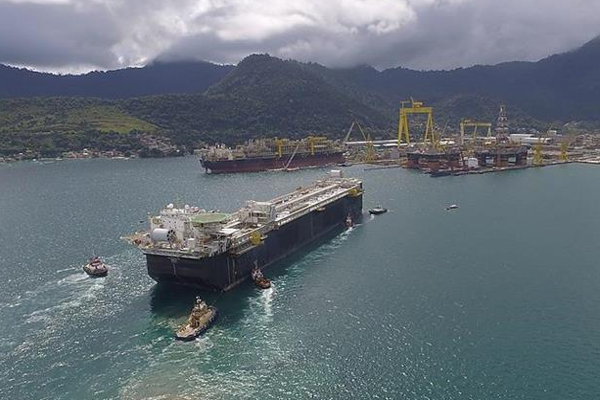
Jeff Fick, Platts S&P Global
RIO
EnergiesNet.com 11 13 2023
Petrobras increased its year-end production targets for 2023 amid better-than-expected performance from recently installed floating production units and prospects for new wells in the fourth quarter, but a tight market for services and supplies will result in lower investment, an executive with the Brazilian state-led company said Nov. 10.
“We observed robust production, within the upper limits in our margin for error,” said Ana Paula Zettel, Petrobras’ executive manager for upstream partnerships and procedures, during a conference call with analysts and investors. The executive noted Petrobras will install five floating production, storage and offloading vessels in 2023.
Petrobras now expects to end 2023 with average oil production of 2.2 million b/d, up from 2.1 million b/d previously, the company said in a filing with local stock regulators made after markets closed Nov. 9. In addition, total oil and natural gas output was raised to 2.8 million b/d of oil equivalent, up from previous forecasts for 2.6 million boe/d.
The brighter outlook came after record subsalt production pushed oil and gas output higher in the third quarter on the strength of the new FPSOs, Petrobras said. Petrobras also expects to accelerate ramp-up activities at remaining vessels as well as connect new production wells in the fourth quarter.
In the third quarter, Petrobras pumped 2.877 million boe/d compared with 2.644 million boe/d in the same period of 2022, the company said Oct. 26. Third-quarter output also advanced 9.1% from the 2.637 million boe/d produced in the second quarter.
Crude oil output jumped 9.6% year on year in the third quarter to 2.318 million b/d, up from 2.115 million b/d in the year-ago period, Petrobras said. Third-quarter oil production also surged 10.3% from 2.102 million b/d in the second quarter.
Four FPSOs have already entered operations, with the FPSO Sepetiba expected to pump first oil from the Mero field in December, said Carlos Travassos, Petrobras’ director for engineering, technology and innovation. The FPSO P-71 installed at the Itapu Field in December 2022 and the FPSO Almirante Barroso installed at the Buzios Field in May both have reached full production capacity of 150,000 b/d, Travassos said.
The FPSOs Anna Nery and Anita Garibaldi started operations in May and August, respectively, as part of a revitalization project at the Marlim complex of offshore heavy oil fields and will take longer, Travassos said. The FPSO Anna Nery, which is currently pumping about 33,000 b/d, will reach full capacity of 70,000 b/d in the first half of 2025. The FPSO Anita Garibaldi, which is producing 15,000 b/d, will reach full capacity of 80,000 b/d in the first half of 2026.
The FPSO Sepetiba, meanwhile, is expected to start production in December, Travassos said. Petrobras recently completed mooring the vessel at the field, which is located in the Libra production sharing area. The FPSO will be the second to enter operations at Mero.
Spending cuts
While the prospects for production growth were stronger than expected, the ongoing reverberations of pandemic-related inflation caused Petrobras to reduce the company’s investment outlook for 2023, executives said. Petrobras reduced planned investments in 2023 to $13 billion, down from initial estimates for $16 billion. Despite the reduction, investments were still about 30% higher than 2022.
“The primary reason for the reduction in investments were challenges in the exploration and production supply segment,” Travassos said. Exploration and production investments were reduced to $11.2 billion from $13.3 billion previously, according to Petrobras.
Petrobras currently is in planning for its 2024-2028 strategic plan, which is expected to be released before the end of 2023, CFO Sergio Caetano Leite said. The plan also likely will include resources for mergers and acquisitions, especially amid Petrobras’ renewed interest in the global petrochemicals industry, the executive noted.
Controlling partner Novonor is in the process of selling its stake in Brazilian petrochemicals producer Braskem. Petrobras retains preferential rights to buy Novonor’s stake, as well as tagalong rights to sell its 47% share of Braskem’s control, Leite said.
So far, Novonor hasn’t received any binding offers, only several non-binding proposals, Leite said.
“Petrobras at this time is evaluating Braskem,” he confirmed, adding that the oil industry as a whole was finding greater value in petrochemicals.
“Braskem is a target, but it’s not the only path for Petrobras to increase its presence in petrochemicals,” Leite added.
William Franca, Petrobras’ director for industrial processes and products, indicated that Petrobras could build its own petrochemicals plant at the GasLub Itaborai complex outside Rio de Janeiro. The complex already includes a gas processing plant connected to a 21 million cu m/d offshore pipeline that will be operational by end-2024.
spglobal.com 11 10 2023











